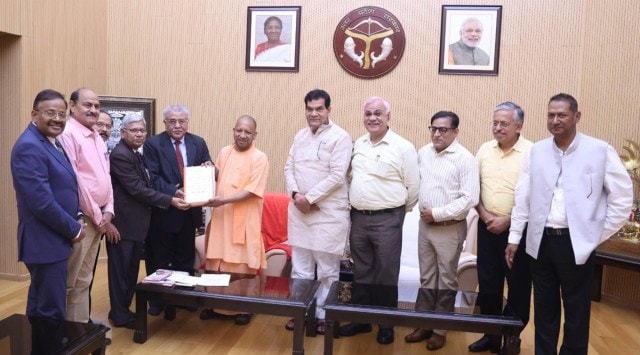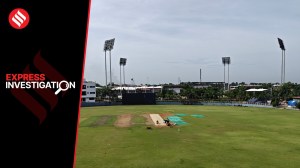Nearly two months after it was constituted by the Uttar Pradesh government to study the representation of Other Backward Class (OBCs) in urban local bodies, the five-member commission on Thursday submitted its 350-page report to Chief Minister Yogi Adityanath in Lucknow.
Justice (retired) Ram Avtar Singh, who led the commission, and four other members — retired IAS officers Chob Singh Verma, Mahendra Kumar, and former additional law advisers Santosh Kumar Vishwakarma and Brajesh Kumar Soni — met the CM chief minister at his official residence to hand over the report in presence of Urban Development Minister AK Sharma and officials of the Urban Development Department.

While the tenure of the commission was six months, it compiled its report after touring all the 75 districts of the state in less than three months, an official said.
“During the field visits and meetings with public representatives and district authorities, anomalies were found in the reservation of local bodies that was notified on December 5, 2022. Anomalies have been found also in the rotation process adopted for deciding reservations in the constituencies. It has been found that there are certain local bodies that have not been reserved for OBCs for more than 30 years. Also, there are some constituencies that have been reserved for OBCs in the past three elections. These anomalies have been mentioned in the report,” said a source.
“It appears that reservation anomalies in the notification of December 5 and in the past elections were deliberate and intentional. As per the commission’s report, changes will be made in the reservation of the urban local bodies,” the source added.
Sources said that a meeting of the Cabinet has been called on Friday to discuss the commission’s report. Also, a copy of the report will be submitted to the Supreme Court, they added.
It is to be noted on January 4 the Supreme Court stayed the Allahabad High Court’s direction to the Uttar Pradesh Election Commission to go ahead with the urban local body elections without giving reservations for Other Backward Classes (OBCs).
Story continues below this ad
Hearing the state’s appeal against the December 27 High Court order, the top court said holding elections without giving reservation to OBCs “will result in violation of the constitutional and statutory requirements of reservation for the OBCs”.
The bench of Chief Justice of India DY Chandrachud and Justice P S Narasimha accepted the government’s contention that efforts will be made to ensure that the UP State Local Bodies Dedicated Backward Classes Commission, set up on December 28 to complete the necessary exercise to meet the “triple test”, completes its task in three months.
The triple test requires the state government to ensure that three conditions are met before reservation is provided to OBCs in local bodies: a) a dedicated commission has conducted a contemporaneous rigorous empirical inquiry into the nature and implications of the backwardness qua local bodies, within the state; b) the government has specified the proportion of reservation required to be provisioned local body-wise in light of recommendations of the commission; and c) such reservation shall not exceed 50 per cent of the total seats reserved in favour of SCs/STs/OBCs taken together.
Now, based on the commission’s recommendations, the state government will figure out proportional reservation for backward classes per each urban local body ahead of the next urban local body polls.
Story continues below this ad
Sources said that the state government want to conduct the local body elections in April or May.
During the field visit, the five-member panel met individuals, officials, sitting representatives, contestants as well as political parties. In these meetings, the commission asked respondents about the total number of OBC corporators elected to the local body in the past 10 years; which group formed the majority among them; whether OBCs were given 27 per cent reservation in previous elections or not; if the quota was enough as compared to their total population; and whether economic weakness was the reason for low representation.
One of the questionnaires seeks more detailed information on the total population of the municipal ward, and the population of OBCs, SCs, STs and transgenders as a percentage of their total numbers.









